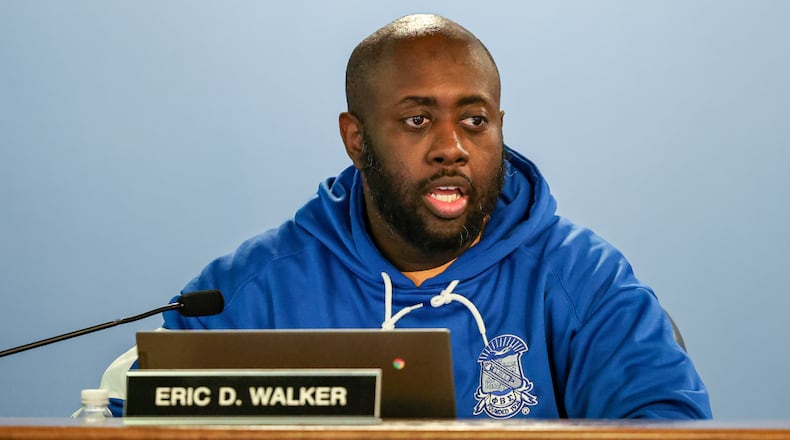Under state law, public schools have to offer the same transportation options to private and parochial students as they do their own.
In April, an 18-year-old Dunbar High School student, Alfred Hale III, was waiting for a bus to get to school near the downtown bus hub when he was shot and killed. After that, local leaders, including Dayton mayor Jeff Mims and state Rep. Phil Plummer, R-Butler Twp., held a press conference where Plummer announced an amendment to the state’s budget bill to prohibit school districts from transferring students at downtown bus hubs in urban areas.
The amendment has changed since then, and now only affects Akron and Dayton.
The district is figuring out how to transport students to school next year. DPS Superintendent David Lawrence said he has met with DPS principals to discuss the problem and business manager Marvin Jones said his team, which oversees transportation, is “working fanatically” to find a solution.
Dayton Public’s board members say with school starting Aug. 12, the change is a burden. The state budget passed and was signed into law on June 30.
Six board members voted not to buy RTA bus passes this year, with one member, Will Smith, abstaining.
“I think that city elected officials and state officials have tied our hands as a district — actually, call a spade a spade — they tied two urban districts in the state ... and it is not changing,” said board member Eric Walker.
Credit: Bryant Billing
Credit: Bryant Billing
He said RTA has already told DPS that they do not have enough buses to run limited service or LS routes, as RTA had in the past.
“It’s a problem,” Walker said. “It will be truly a problem for parents, but those who are elected to those areas did this and continue to do things that harm us.”
DPS board member Jocelyn Rhynard said the board has been put in this position because of the Ohio statehouse.
“I would like to affirm that every single person on this board and every single person in this district wants to transport our students from their homes to school and from school back to home at the end of the school day,” Rhynard said. “Every single person here wants to be able to do this, but we logistically cannot meet the demands of the statehouse to also transport the nonpublic students in Dayton.”
Board member Joe Lacey suggested providing a stipend to Dayton Public students to buy bus passes, with the stipulation that they show the district they purchased the bus pass and are going to school. But he said the board would need to talk to their legal representation about whether that would be a reasonable workaround.
Board president Chrisondra Goodwine called on the members of the public to help the board figure out how to bus students.
“We need people who are willing and active and ready to do something with us and for these children that will never be able to repay you,” Goodwine said.
Board vice president William Bailey said he would like to hear some buy-in from the charter schools whose students will also be impacted by the change.
“It’s a shame that we’ve been in all these meetings over these past few months and those that kind of put us in this position, tied our hands to this thing, are also at the table saying, ‘we want to help you with a solution,’ but they don’t have a solution,” Bailey said.
Board member Will Smith encouraged members to think about resources and solutions.
“I think for me it’s a lesson in understanding what we have, understanding our resources, and not pushing for things that we do not have because this is where we end up sometimes,” Smith said. “So we’re going to move forward.”
Board member Karen Wick-Gagnet said the move will likely save about $2.26 million.
“So we are in a position to respond by limiting things to a degree,” she said. “So that’s weird. But I believe that we all deserve safe transportation.”
About the Author



